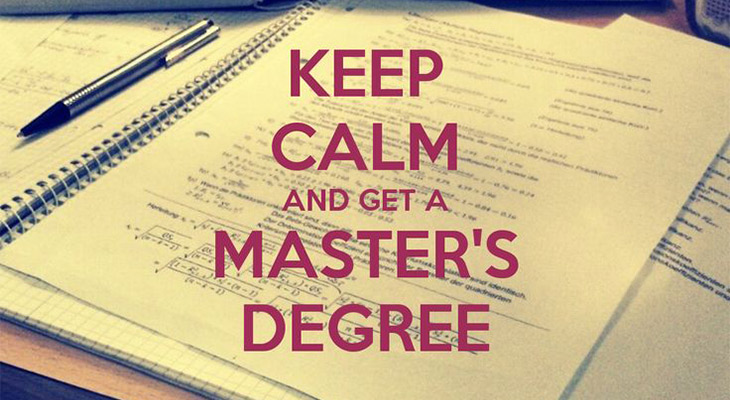Many believe that a Master’s degree can help you get better jobs and give a significant advance over the competition is an already challenging job market. To some extent, that belief holds some truth to it; however, a master’s isn’t necessarily a determinant in regards to whether your career success and actual employment are more likely to happen due to a degree. Some skills cannot be taught in class and to provide excellent work you need a great deal of experience; something you might not be able to get in your master’s studies.
However, getting a Master’s degree can be useful for specific job positions and careers. Moreover, during master’s, one has access and ability to acquire useful, and overall necessary skills for a successful career, like self-discipline, time-management and ability to meet deadlines. Not to mention that the postgraduate programs like Master’s can make you more mature, responsible and accountable. All of these skills are highly sought for in the job market, and the ones who have them are more likely to get the job. So, to differentiate between the significance and insignificance of getting a Master’s degree, we’ve come up with a list of the usual pros and cons. But, before we dive in, make sure to hop over to edusson.com in case you need help with the essay, paper, and even dissertation writing.

Pros
- Ability to grow in a subject you’re passionate about: Personally, one should go for a Master’s degree only if they’re passionate about a specific subject. After earning a BA, a student is well aware of the fact that they either loved what they’ve studied or if they’re tired of a particular subject and want to pursue something else. Just because the job market is looking for a certain profession, which requires having a Master’s degree, one shouldn’t continue with their studies. However, if their is something one is passionate about, the master’s program is an exceptional opportunity to sharpen and enhance the knowledge you have, as well as to acquire even more useful and overall essential skills. So, in that case, having a Master’s degree is not only important but preferable, just in case you want to make a career out of a specific subject.
- It’s evidence of your academic value in a subject: One of the questions your employer might ask you during a job interview is the reason you wanted to pursue a Master’s degree and what you gained from it. Of course, there are several ways to answer these questions, but the most obvious one is the fact that a Master’s degree provides evidence of the added value your postgraduate program has given to you. This is the best way to explain and articulate the skills and knowledge you’ve gained that can apply to a particular job position and workplace. A Master’s degree gives you the confidence to have a completely clear view, provide excellence and demonstrate your academic and professional abilities, to employers and colleagues. It also shows that you’re specialized in a specific field and subject matter, which also gives you an advantage over those who may not be specialized for a particular position.
- MA is an advantage over competition: Earning a Master’s degree is time-consuming and takes a lot of dedication and hard work. This is also the very indication of your competitive advantage; a Master’s degree gives instant credibility and also increases the chances of higher salary and better job opportunities. The very fact that you’ve dedicated two extra years to develop your knowledge and skills is impressive in itself, so no wonder that having MA next to your name on the resume increases chances of getting employed over those who don’t. Not to mention that there is a greater chance of promotion at work or getting an executive-level business administration job straight ahead.
Cons
- The Cost: According to Unibaggage, a Master’s degree can cost approximately between 5,000 dollars and 40,000 dollars, depending on where, what and how you study. This is just for the tuition, as the estimated cost does not include the cost of living. Of course, there are ways you can lower the costs of the postgraduate program and not plummet into a never-ending hole of debt. For example, loans can cover your tuition, or a part-time job can also help you out. However, this can create additional stress as it is getting harder and harder for students to balance work and studying. Therefore, if you want to work in a firm or position that doesn’t require an MA, or you’re not merely passionate about your studies, then in your case, a Master’s degree is unimportant.
- The Time: Depending on the postgraduate program you take, doing a Master’s degree can take you somewhere between one to three years of additional class attending, exams passing and studying. This can seem like a long time, especially if you’re not passionate about the program or your graduate friends are moving on with their lives and careers. It can seem like you are falling behind, which can be ultimately demotivating and stressful. Even though getting a Master’s degree can benefit your professional life in the long run, the fact that you feel like you’ve stalled can be quite frustrating. So, in case you’re not sure about studying for another three years, and if you feel like it won’t benefit you, but harm you, then work with what you have and pursue a career outside the Master’s degree realm.
- The Sacrifice: Due to commitments and workload, there are many things one needs to sacrifice during the postgraduate program. Getting a Master’s degree can be intense, time-consuming and energy-draining, so the social side of your life might suffer. Of course, the postgraduate program will give a great opportunity of meeting new people, but most of the time it can be completely solitary and lonely. Not to mention the fact that you might be required to look for private accommodation that is not so close to the university, or spend hours and hours at the library studying and writing papers. Pursuing a Master’s degree can be stressful and demotivating, so if you’re unsure about the chance to turn to your old life once you’re done, then consider getting a job instead of a Master’s degree.
Careers that require a Master’s Degree in Education
To paint a better and bigger picture for those who are still unsure whether a Master’s degree is essential for their careers, here’s a list of job positions that require one such degree, according to BestMastersPrograms:
- College professor
- Literacy teacher
- Administrator
- Counselor
- Author
- Social worker
- Dietician
- Marriage and family therapist
- Public policy analyst
- Disaster and emergency specialist
- Manager
- Occupational health and safety officer
- Public health nurse
- Criminologist
- Biostatistician
- Physical therapist
- Correctional facility psychologist
- Economist
- Astronomer
- Physicist
- Computer software engineer, etc.















